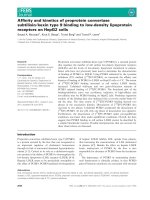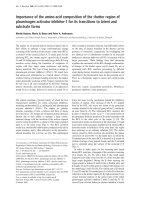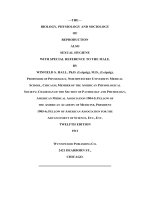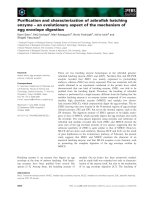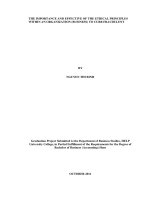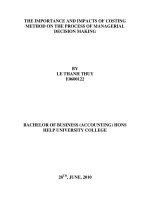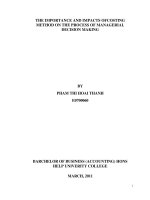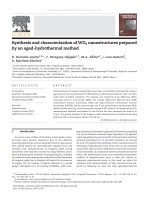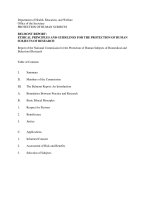the importance and effective of the ethical principles within an organization (business) to curb fraudulent
Bạn đang xem bản rút gọn của tài liệu. Xem và tải ngay bản đầy đủ của tài liệu tại đây (745.46 KB, 68 trang )
THE IMPORTANCE AND EFFECTIVE OF THE ETHICAL PRINCIPLES
WITHIN AN ORGANIZATION (BUSINESS) TO CURB FRAUDULENT
BY
NGUYEN THI BINH
Graduation Project Submitted to the Department of Business Studies, HELP
University College, in Partial Fulfillment of the Requirements for the Degree of
Bachelor of Business (Accounting) Hons
OCTOBER 2011
ii
DECLARATION OF ORGINALITY AND
WORD COUNT
I hereby declare that the graduation project is based on my original work except
quotations and citations, which has been duly acknowledged. I also declare that it has
not been previously or concurrently submitted for any other course/degree at Help
University or other institutions. The word count is 12,624 words.
NGUYEN THI BINH
17 OCTOBER 2011
iii
ACKNOWLEDGEMENT
To complete this thesis, first at all, I want especially to thank sincerely to my
supervisor Dr Pham Duc Hieu, International School, Vietnam National University
Hanoi. He is the teacher who is not only caring me during my thesis work but also
a mentor to teach me all those years in International School. I would like to express
my thanks to Ms. Sumathi, Help University College, who initiated and give so much
instruction and support about the dissertation.
Additionally, I also wish to take this opportunity to thank all others Vietnamese
teachers at International School and the Malay teachers at Help University College
who taught and helped me during the study process at the International School Now.
Based on knowledge accumulated over 5 years of study and major in accounting
literature time, I have completed the course of this dissertation. I cannot express all
my thoughts here. I will never forget he teachers and friends who have worked
closely with me throughout my five years of study at the University.
Finally, I would like to express want to send thanks for my parents who are laid on
my background and create everything for my completeness of course during five
years at school.
iv
THE IMPORTANCE AND EFFECTIVE OF THE ETHICAL PRINCIPLES
WITHIN AN ORGANIZATION (BUSINESS) TO CURB FRAUDULENT
BY
NGUYEN THI BINH
OCTOBER 2011
Supervisor: Dr. PHAM DUC HIEU
ABSTRACT
Fraud is the sensitive problem in any organization in business. It’s not easy for
us to get information about this problem. It’s also link with code of ethic. In this
thesis, I test with three hypotheses. As the results, I examine whether economic
conditions influence the propensity to commit accounting fraud. I find that the
incidence of observed accounting fraud is increasing and is at its highest in the
periods leading up to an economic peak. One more result, new accountants who have
less experience have high accounting transparency than old accountants who have
more experience. But they also break money culture than who have more experience.
Because of all the things, so we constantly learn about fraud and errors in accounting
and auditing.
v
TABLE OF CONTENT
DECLARATION OF ORGINALITY AND WORD COUNT ii
ACKNOWLEDGEMENT iii
ABSTRACT iv
TABLE OF CONTENT v
LIST OF TABLES viii
LIST OF ABBREVIATIONS ix
CHAPTER 1: INTRODUCTION 1
1.1 Research background 1
1.2 Problem statement 2
1.3 Research question 3
1.3.1 Fraudulent in developed countries 3
1.3.2 Fraudulent in Vietnam 5
1.4 Thesis structure 7
1.5 Objective of thesis 7
CHAPTER 2: LITERATURE REVIEW 8
2.1 Definition of Fraudulent 8
2.1.1 Detecting Fraud 9
2.1.2 Why does the definition matters 10
2.1.3 Small, medium and large enterprises 11
2.1.4 Internal and external fraud 11
2.1.5 Outsourcing fraud control 12
2.2 Code of Ethics 15
vi
2.2.1 Definition of business ethic and factors affecting business ethics 15
2.2.2 Code of ethics 16
2.3 Related Theory 18
2.3.1 Control fraud theory 18
2.3.2 Ethical theory 19
2.3.3 Utilitarian approach 19
2.4 The Factors that Contribute to Accounting Fraud 21
2.4.1 Corporate Transparency 21
2.4.2 Money Culture 23
2.5 Relationship between fraudulent and ethic 25
2.6 Hypothesis statement 25
CHAPTER 3: RESEARCH AND METHODLOGY 28
3.1 Research method 28
3.1.1 Quantitative methodology 28
3.1.2 Qualitative methodology 28
3.2 Data source 29
3.2.1 Secondary data 29
3.2.2 Primary data 30
3.3 Research tool 30
3.3.1 Internet tool 30
3.3.2 Questionnaire 31
CHAPTER 4: FINDING AND DISCUSSION 32
4.1 Questionnaire Results 33
4.2 Result Analysis 34
4.2.1 Hypothesis 1 34
vii
4.2.2 Hypothesis 2 36
4.2.3 Hypothesis 3 39
4.3 General Discussion 41
CHAPTER 5: CONCLUSION AND RECOMMENDATION 43
5.1 Implications 43
5.1.1 Implications for Government 43
5.1.2 Implications for the enterprise 44
5.2 Prevention 45
5.3 Conclusion 46
REFERENCES 48
APPENDIX A: QUESTIONAIRE SAMPLES 51
APPENDIX B: CHI-SQUARE TESTS 54
viii
LIST OF TABLES
Table 2.1: Outsourcing fraud control
Table 4.1: show respondents of each statement
Table 4.2: Descriptive statistics for hypothesis 1 (economic survey)
Table 4.3: Chi-square test for economic survey
Table 4.4: Descriptive statistics for hypothesis 2 (transparency survey)
Table 4.5: Chi-square test for transparency survey
Table 4.6: Descriptive statistics for hypothesis 3(CEO and money culture survey)
Table 4.7: Chi-square test for CEO and money culture survey
ix
LIST OF ABBREVIATIONS
APS
Australian Public Service
CEO
Chief Executive Officer
CFO
Chief Financial Officer
EPS
Earnings Per Share
FS
Financial Statements
GAAS
Generally Accepted Auditing Standard
GAAP
Generally Accepted Accounting Principles
IFAC
International Federation of Accountants
IESBA
International Ethics Standards Board for Accountants
ODA
Official Development Assistances
PE
Price per Earning
PMU
Project Management Unit
WTO
World Trade Organization
1
CHAPTER 1: INTRODUCTION
1.1 Research background
During the period when Vietnam joined the WTO-World Trade Organization, the
economy of my country is facing with a new challenge and Vietnam and auditing
industry entered a period of great development with many difficulties and new
opportunities. The auditing firm was established competition. Hence, organizations
tend to fraud in order to serve the purpose of personal firm to harm interests of the
community. The organization can survive in the competitive era without resorting to
unethical practices. This study provides readers with an understanding of the
necessity of the role of ethics in the modern organization. It mentions the importance
of leadership in the establishment and maintenance of ethical principles in the
organization and pinnacles with a set of recommendations that leaders can be
assigned to ensure that our moral remains. This study examines the growing
emphasis that companies place on business ethics, business ethics as well as inform
the lives of people in business. Current perspective and legal only enhance the
importance of moral codes, making them an important part of the landscape of the
company. The increasing relevance of the cost regardless of business ethics is
recorded. Emphasis is placed on the importance of stressing business ethics in
society, and about teaching the concept to us that they will carry a strong sense of
ethics in the business world effect. Conversely, any problem in an y field has two
aspects, particularly moral in an organization, too. There are ethical and unethical
behaviors. Concretely, in unethical of some Vietnam organizations nowadays, the
2
fraudulent is understandable. It belongs to each sense or ethic of individual. None
can sure that they can do all things by right ethics; hence, so many organizations
have fraudulent work. For instance, according to recent studies indicate an emerging
problem in Vietnam is now the fraud in the petroleum business.
Fraud in information disclosure on financial statements is one of the current topics in
news, especially after a series of events companies in the top world is being bankrupt
in the early 21
st
century. The bankrupt company was said to be fraud on financial
statements can tell a lot as: Lucent, Xerox, Rite Aid, Waste Management, Micro
Strategy, Raytheon, Sunbeam, Enron, WorldCom, Global Crossing, Adelphia,
Qwest. Senior managers including chief executive officer (CEO) and chief financial
officer (CFO) of these companies were allegedly involved in the processing of data
lead to fraudulent financial reporting.
1.2 Problem statement
Today, the issue of fraud in business is increasing for instance the case of sale or
falsified invoices in the invoice price does not tend to decline. This situation is
puzzling managers in particular and society in general, there are those who took
advantage of the loophole in the law and the management of the company to extract
more money from companies and individuals own pocket. Arising from the problems
mentioned above, the need to research the side of morality and take measures to
minimize these problems is essential. So, to better understand these issues I would
like to present the theme: “The importance and effective of the ethical principles
within an organization (business) to curb fraudulent”
3
1.3 Research question
This study concern about” the important and effective of ethical principles
within an organization to curb fraudulent”. Hence there are some involving this
theme. What is the relationship between ethics and fraud? Why Fraud Is Increasing?
How is fraudulent in developed countries and special in Viet Nam? How to Prevent
Business Fraud? How is important of ethical principles in curbing fraudulent? Why
are ethical principles effective to curb fraudulent? To answer all these above
question, we will discuss gradually widespread all this thesis.
1.3.1 Fraudulent in developed countries
In recent years, it has been nearly impossible to open any business newspaper or
magazine without seeing headlines relating to various types of corruption. One type
of corruption has been especially prevalent - fraudulent financial statements. While
Europe has experienced several financial statement frauds, including those of
Parmalat, Royal Ahold and Vivendi, they have not been nearly as devastating as
those in the US. Enron, WorldCom, Fannie Mae, Waste Management, Sunbeam,
Qwest, Xerox, Adelphia, Tyco; these and many other recent financial statement
frauds have shocked the business world. In this part, I present the problem of fraud
related to the developed countries and it is second typical for the world's financial
statement fraud that is WorldCom and Enron.
The cost of all frauds - especially financial statement fraud - is extremely high. For
example, when a company manipulates its financial statements, the market value of
that company's stock usually drops considerably, sometimes by as much as 500 times
4
the amount of the fraud. Six of the top ten bankruptcies in US history occurred in
2002. When a company such as WorldCom declares a $102bn bankruptcy, nearly
every person who has a pension or owns mutual fund shares is hurt financially.
Indeed, the cost of these financial statement frauds was borne by the entire country.
When a financial statement fraud occurs, the decline in market value and lost
revenue for a company can be astronomical.
A company's financial position is largely a result of its performance and the level of
growth it is trying to achieve. Most of the companies that committed financial
statement fraud in the past few years had large amounts of debt and leverage. This
placed tremendous financial pressure on executives, not only to have high earnings
(to offset interest costs), but also to report earnings to meet debt and other covenants.
Enron's derivatives related liabilities increased from $1.8bn to $10.5bn in 2000.
In the 1990s and early 2000s, many of the problems at US companies were masked
by the good economy. History has now shown that several of the frauds were
actually being committed during the boom years, but the economy hid the behavior.
The boom also caused executives to believe their companies were more successful
than they were. Sundaramurthy and Lewis (2003) found that extended periods of
prosperity can reduce a firm's motivation to comprehend the causes of success,
raising the likelihood of faulty attributions. Managers can also feel significant
pressure when their personal financial status is at risk. For example, they may feel
their job is in jeopardy if performance falls below a certain level. The fear of losing
one's job as a result of poor financial performance has contributed to various frauds
throughout the past decade.
5
1.3.2 Fraudulent in Vietnam
In recent years in Vietnam, a series of economic fraud, trade fraud and fraud on
the financial statements are brought to light, that cheating occurs in all types of
enterprises and in all areas. On 25/11/2008, in Hanoi, the State Auditor held a press
conference and publicly the results of several audits in 2008. According to the audit
results were announced this time for the unit: Electricity of Vietnam, Ta Trach Lake
of project and procurement management and use of property in the original project
manager of several ministries and local. Through the inspection, the state audit
process and the proposal were withdrawn and the State budget is being paid
thousands of billion: Electricity of Vietnam: 2,216 billion, Ta Trach Lake of project:
128 billion. And according to a result of auditing the State Auditor in a public
meeting publicize results of several audits on 02/12/2009 in Hanoi, the general
results of the audit report was issued and the released to 30/11/2009, discovered and
financial proposals over 6.566 billion. Clearly, business fraud involve cheating on
the financial statements are no longer problems of an industry - a sector that has
invaded the whole economy: from the state corporation, the Investment funds using
ODA capital, the company shares listed on the stock market to the private
companies.
* The type of fraud for each type of enterprise.
- Fraud in state enterprises:
+ Fraud in procurement of equipment, declaring costs: One of the typical businesses
for this type of fraud is fraud in corporate aviation Vietnam Airlines.
+ Fraud in construction.
6
Fraud in construction is a hot spot in recent years. Frauds not only through the
bidding process, bid (lower bid to win the bidding, bribed the authorities). But then,
to compensate for losses in the bidding process, the contractor did not hesitate to
reduce the cost of construction, installation, and even corruption and embezzlement.
The quality of construction, thus increasingly impaired. Investors, construction and
design consulting combustion monitoring period, do not handle the road according to
the designs, skip loading phase should have completed construction is already sunk.
- Cheating in stock listed companies: The Bach Tuyet Cotton Corporation (BBT
stock) report loss to profit
- Fraud in the private enterprises, limited liability companies
- Fraud in companies with foreign capital: Although there is not an official report on
the fraud in the financial statements of companies with foreign capital, but through
interviews and testing auditors showed that two common trends make fraud in these
companies. In the case of a subsidiary in Vietnam has committed to profitable
business plan for the parent company. If the company does not achieve the ability to
plan, will be fraud and declared lower cost of debt or moving costs - the debt of the
period to the next accounting period, or declaration of income. Conversely, if the
company is focused on reducing the problem of enterprise income tax payable, it
shall be taken to the declaration of expenses and liabilities or deliberately prepaid
expenses of public debt in the next accounting period are now, recorded lower
revenues.
7
1.4 Thesis structure
My research included five parts and each part is a chapter
Part one is chapter one: Introduction
Part two is chapter two: Literature Review
Part three is chapter three: Research Methodology
Part four is chapter four: Finding and Discussion
Part five is chapter five: Conclusion and Recommendation
1.5 Objective of thesis
To learn about the factors that constitute accounting fraud
to learn about the application of ethical principles of accountant or auditor in
Vietnam and other developed countries
To learn about how this theory is applied in practice?
To help us understand how the importance of effective and ethical principles
in an organization to combat fraud?
Because accounting plays an important role in the financial statements of the
business, so in this essay can help us confirm the value of ethical principles
correctly
8
CHAPTER 2: LITERATURE REVIEW
2.1 Definition of Fraudulent
In the world, there is no premise legal definition for fraud exists, because such
actions were covered up the actions of each country. Each country with a national
fraud that it has the action for fraud, so there is no international act exists for it.
According to Vietnamese dictionary, fraud is an act of dishonesty, deception, trick so
as to fraud other people. In broad terms the fraud is distorting the truth, implement
illegal acts to fraud, deception to obtain a certain benefit. Three common expressions
of fraud are: appropriation, fraud and theft. As I personally know, fraud is the act of
intentionally falsifying information economics, finance by one or more persons in the
organization or the third party made, which affect the audit object. In the field of
financial accounting, fraud might merely an intentional act of infringement of
property, embezzlement, embezzlement, corruption, collusion but infringe upon
the property often associated with distortion of accounting information as the
profession records are not true, counterfeit or repair documents, hiding files and
documents, covering key information, etc.
9
2.1.1 Detecting Fraud
Fraud is a broad category, we cannot determine when it occurs, and it is
intentional or unintentional? Auditors play an important role in detecting fraud. So
the ability to judge and main key in detecting potential fraud and auditing standards
generally recognized GAAS (Generally Accepted Auditing Standard) gives specific
guidance in detecting fraud. Specifically:
The auditor may decide to cheat is separate from the affected area and report
to the board significant business results or not?
If the effect on the auditor may decide to fraud is separate and can be
significant in controlling the business system, item or not?
If it not major impact on the individual areas, auditor consider this issue
related to the management system or not? Auditors must consider whether
disclosure fraud is affecting the whole seriousness and integrity required of
the administrator or not?
If the auditor's decision errors caused by fraud or substantial and auditors cannot
determine the level of fraud affecting the financial statements, I think that auditors
may consider the following guidelines:
Have to collect more evidence
Consider their impact on other areas of audit
To discuss this issue, including what is obtained in the investigation of
additional management level.
To consider consulting with clients to detect fraud
10
To consider withdrawing from the audit if the audit results indicate that the
existence of material misstatement related to fraud and should discuss the
reasons to withdraw from the audit client
Consider consulting advice of legal experts.
Experience has shown, the determination of the likelihood of losses due to fraud is an
art, not merely a pure science. Information gathered from different sources should be
checked before coming to conclusions. In this regard, organization should first:
- Assess the possibility of fraud in the enterprise based on the internal control
environment, the resources to handle fraud, management's efforts to detect fraud and
other ethical standards in business industry.
- Based on your experience, gather the available evidence of fraud in businesses such
as reports of fraud before, the losses cannot be identified, the problems noted in
previous audits, complaints of customers or suppliers.
- Collection of information available about the damage and loss due to fraud within
the business from the same scale in the industry.
- Collect information from surveys of fraud such as fraud investigations of the global
Ernst & Young on bribery and corruption in business, this is the source document
provides valuable information relevant to this subject in Vietnam.
2.1.2 Why does the definition matters
The consistent application of this definition of the national government
provides the fundamental framework for verifying, put in writing and control fraud.
It reinforces the assessment of risk and fraud control plans, and ensures that APS
employees understand the causes leading to fraud. Defining the problem of fraud to
11
help the government measure accurately and allocate resources to match, as well as
APS to handle fraud cases fairly.
2.1.3 Small, medium and large enterprises
The size of each different business accompanied by the appearance of various
types of fraud is different. So they will be faced with different problems of fraud.
The provisions made by law, apply to businesses are the same and consistent.
Because the intangible value of each different businesses that it is important that each
business be aware of legal issues which made them to be able to control fraud easier.
For small and medium enterprises need the support from big business than it and the
support from the consultant’s economic law to create system of strict control fraud
for the purpose of achieving economic efficiency as set out.
For large businesses need be uniformity in the organization of personnel,
decentralized management, allocated resource makes the corporate structure more
complete for the purpose of preventing and limiting fraud by improving aware of the
importance of controlling fraud.
2.1.4 Internal and external fraud
There are several common methods to control fraud, regardless type of
organization, whether it's fraudulent internal or external. Internal fraud is carried out
by an employee of the agency they work for. External fraud is implemented by
someone from outside agencies. Fraud can be committed to cooperation between
body worker and someone from outside agencies. For example, support staff can take
12
the form of creating or accepting a false identity, providing illegal payments or
benefits provided, or confirmation that the goods or services have been assigned
when they are not. Fraud section should be treated and reported as two-a fraud
internally and externally. Customers, contractors, consultants and non-governmental
organizations could cheat with the Commonwealth. organization, as part of risk
assessment, fraud checking capabilities outside of the various stakeholders and make
appropriate arrangements, reports and contracts to stop fraud, and for deal with it
effectively if it occurs. Solution of internal fraud and external arrangements may
require different ways or approaches. For example, different arrangements may be
necessary to enable employees to report alleged cases of possible fraud in their
agencies with requests for customers to report fraud. Some actions of employees can
be the violations of the Code of Conduct rather than fraud and should be dealt with
accordingly. Moreover, some problems may be cheating will be treated as violations
of the code (for example, access to information). Dealing with violations of the laws
of behavior in time can prevent inappropriate behavior from escalating into criminal
activity. Dealing with internal fraud can help reduce fraud by reducing the external
opportunities for workers to support the stakeholders to implement fraud.
2.1.5 Outsourcing fraud control
Some agencies, in particular smaller agencies, may need to outsource their
fraud control arrangements.
If an agency outsources its fraud control arrangements, it must ensure that:
- the tasks/requirements are clearly spelt out in the contract;
- fraud control plans are based on current risk assessments;
13
- fraud control plans cover all aspects of the agency, such as its programs;
- the plan is not generic in nature; and
- An in-house contact point is provided for reporting and recording allegations
of fraud and a manager is appointed to be responsible for fraud control
overall. While all or part of fraud control arrangements can be outsourced,
agencies remain accountable for meeting their obligations under legislation
and the Guidelines.
14
Figure 2.1 sets out the arrangements for an Australian Government agency that has
outsourced most of its fraud control arrangements.
Figure 2.1: Outsourcing fraud control
The National Library of Australia has refined its fraud control requirements to better
reflect its actual needs. One agency employee is designated as the main contact point
for the contractor and manages the contract, consulting if necessary with in-house
contract management expertise. The contact point is responsible for fraud control
activity in the agency, has a detailed understanding of the operations and is also
Secretary to the Audit Committee. That person closely monitors performance of the
contractor against contract requirements.
The National Library of Australia has contracted a single provider. Fraud control
outputs covered by the contract include: the development of a fraud control
management policy; a fraud risk assessment and accompanying fraud control plan;
fraud investigative guidelines (using recently issued Australian Government
Investigation Standards, but tailored to the agency’s particular needs); and
development and delivery of employee training. Other specifications in the contract
also address the following issues:
the quality and style of presentation of work;
the level of contractor security clearances;
the experience and level of qualifications of the individual personnel
conducting the consultancy (for example, that employee training is delivered
by personnel experienced in delivering training to adults and in investigating
fraud);
the scope of work; and
A range of fee options, which provide both client and contractor with
flexibility about the way services, may be delivered.
To provide protection for both parties, a scoping document is signed off by the
contractor and the contact point for each significant piece of work.
(Source: Information provided by the National Library of Australia)
15
2.2 Code of Ethics
2.2.1 Definition of business ethic and factors affecting business ethics
Ethical values are the foundations on which a civilized society is based on.
Without them, the civilization collapses. In business, the purpose of ethics is to direct
business men and women to abide by a code of conduct that facilitates public
confidence in their product and services. In the accounting field, professional
accounting organizations recognize the accounting profession’s responsibility to
provide ethical guidelines to its members. Ethics must and should be taught. People
are not born with the desire to be ethical or be concerned with the welfare of others.
And contrary to all beliefs, one person can make a difference.
Accounting ethics is both a normative and descriptive discipline. Interest in business
ethics and accounting ethics accelerated dramatically during the 1980s and 1990s,
both within major corporations and within academia. When we talk about accounting
ethics, we always link the term with creative accounting, earnings management,
misleading financial statements, securities fraud, insiders’ transactions, bribery,
executive compensation and many more. If you occupy a position of leadership, then
your actions will profoundly influence those who follow your example. And the
well-known cases of fraud, WorldCom and Enron included, prove just that. Elements
affecting business ethics are personal code of behavior, ethical standards for
managers, company policy and ethical suit with the country.
16
2.2.2 Code of ethics
Each day we are challenged to be fair and consistent, to be compliant with the
laws that govern our activities, and to notify others when something needs to be
corrected. Our Business Code of Conduct and Ethics provides you with guidance in
making the right choices when called upon to do so. Please become familiar with this
Policy, as well as all of our Corporate Compliance Policies and Standard Operating
Procedures. As you review these materials, please keep in mind that it is not simply
the letter of the policy, but the spirit of our Policies that we all must embrace.
Professional accountants have an important role in society. Investors, creditors,
employers and other sections of the business community, as well as the government
and the public at large rely on professional accountants for sound financial
accounting and reporting, effective financial management and competent advice on a
variety of business and taxation matters. The attitude and behavior of professional
accountants in providing such services have an impact on the economic well-
being of their community and country. International Standards Accounting Board of
Ethics (IESBA) issued Code of ethics for Professional Accountants. It’s an
independent board in standard-setting of IFAC. Code set the ethical requirements for
professional accountants and provides a conceptual framework for all professional
accountants to ensure compliance with the fundamental principles of professional
ethics and more principle which I consider that it’s also important is technical
Standards. These principles included integrity, objectivity, professional competence
and due care, confidentiality, and professional behavior, technical Standards.
+) Objectivity: A professional accountant should be fair and should not allow
prejudice or bias, conflict of interest or influence of others to override objectivity.
